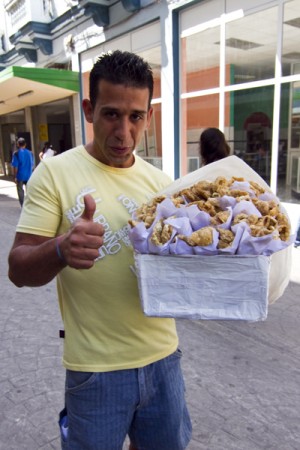Big happenings over the weekend. Raul convened the first Cuban Congress in 14 years. Says things need to change in Cuba, particularly with the economy which needs to be loosened up to allow for a more entrepreneurial style and less involvement by the government. You won’t find anyone in Cuba arguing against that, but the locals I talked with all seemed to think that it was all much ado about nothing.
“The thing is,” Antonio told me, “is that they allow us now to open a little shop, but they do not allow you to buy the things you need to run a business. So what good does it do to open a car repair shop for instance if you can’t get mufflers or spark plugs? There are more tiendes, yes, but they only sell things that Cubans can make themselves, like wooden toys, or things they grow. There is no source to buy anything else.”
Walking around old Havana this weekend, I’d say Antonio was spot on. There definitely are more little shops then there were even two years ago, but almost everything in them is handmade and the quality is often pretty marginal at best. The little shop with baby clothes, for instance, had only a dozen or so hand-knitted booties and sweaters. The music shop had a few homemade instruments—the wooden sticks, called claves, that are played by striking them against one another; a primitive-looking güiro, which is nothing more than a hollowed-out gourd, and a well-worn bongo. It’s almost impossible to go into any bar or restaurant in Cuba and not come across a live band, but you have to wonder where the musicians find their guitars and trumpets and the like. My guess is that mostly they are family heirlooms, like many of the old cars, passed down from father to son for the last 50 years.
Still, the Cuban people are nothing if not enterprising. Antonio introduced us to a friend of his who was walking the streets selling chicharones, those addictive fried pork rinds that go so well with a really cold beer. The guy was selling a paper cone full of the fried pork rinds for one peso. Antonio told me that the guy was an apprentice for a butcher and was paid in scraps of meat. The few odd bits and pieces of a pig that the butcher couldn’t sell, like the skin, was given to the apprentice. The guy then traded a few cuts of meat—maybe a pig head, for example—to a guy who worked in a paper factory. In return, the guy at the paper factory stole small rolls of thin paper that he gave to the apprentice. Then the apprentice had his mother cook up the pork skin in its own grease, cut the thin paper into cones, and went out on the street to sell his chicharones. On a good day, he might sell 20 or 25 bags of fried pork skin. And net as much as the average Cuban in a single month. This is the way the real economy in Cuba works.


Recent Comments